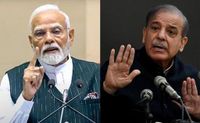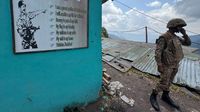In a dramatic escalation of tensions between India and Pakistan, multiple major airlines have suspended flights over Pakistan as of May 6, 2025, following a recent massacre in the region. The decision comes in the wake of a horrific attack that left 26 civilians dead, primarily tourists, in the Indian-administered town of Pahalgam, Kashmir. The incident has reignited longstanding hostilities between the two nuclear-armed neighbors, prompting Air France and Germany’s Lufthansa to announce they are avoiding Pakistani airspace until further notice.
In a statement to CNN, Air France cited the "recent evolution of tensions between India and Pakistan," emphasizing that it is adjusting its flight schedules and routes accordingly. Lufthansa confirmed to Reuters that it too is steering clear of Pakistani airspace, a move that reflects growing international concern over the deteriorating situation. This disruption in air travel comes just weeks after the attack, which India has attributed to militants with ties to Pakistan, a claim that Islamabad vehemently denies.
The attack on April 22, 2025, has led to a series of retaliatory measures from both nations. Since the massacre, both India and Pakistan have closed their airspaces to each other’s aircraft, and international flights are now being rerouted over the Arabian Sea to avoid Pakistani territory. Flight-tracking data indicates that airlines such as British Airways, Swiss International Air Lines, and Emirates are altering their paths, resulting in longer flight times and increased fuel costs.
As tensions mount, both nations have been flexing their military capabilities. On May 5, 2025, Pakistan conducted its second missile test in three days, launching a Fatah series surface-to-surface missile with a range of 120 kilometers. This follows the successful test of a ballistic missile just two days earlier. In a corresponding show of force, India has ordered all states and union territories to conduct mock security drills on May 7, 2025, for the first time in over 50 years, indicating the seriousness with which Delhi views the current standoff.
Indian Home Minister Rajnath Singh hinted at possible military strikes, stating, "I want to assure you that under Prime Minister Modi’s leadership, what you desire will certainly happen." This rhetoric has heightened fears of an imminent conflict, with both nations preparing for potential military action.
In a further escalation, India has suspended its involvement in the 1960 Indus Water Treaty, which governs water sharing between the two countries. This treaty has historically been a point of contention but has also served as a crucial resource-sharing agreement. Following the attack, New Delhi announced it would put the treaty in "abeyance" until Pakistan ceases its alleged support for terrorism. Indian media reports suggest that the flow of water from the Baglihar dam in Indian-administered Kashmir has already been curtailed, raising alarm in Pakistan, which relies heavily on these water resources.
Pakistan's response has been swift; officials have warned that any attempt to divert water will be considered an "act of war." The Pakistani government has expressed its concern over India's hydro projects, stating, "We are aware that India has started work on hydro projects" since the treaty's suspension.
As diplomatic ties fray, cultural exchanges between India and Pakistan have also come to a halt. India has blocked the social media accounts of several Pakistani celebrities, including popular actors and sports figures, as part of a broader strategy to isolate Pakistan. Notably, a much-anticipated Indian film featuring Pakistani actor Fawad Khan has been delayed indefinitely, reflecting the growing animosity between the two nations.
Moreover, India has canceled nearly all visas issued to Pakistani nationals, including those for medical treatment, and has expelled several staff members from the Pakistan High Commission in New Delhi. In retaliation, Pakistan has announced the expulsion of Indian diplomats, further straining diplomatic relations.
Trade has also been severely impacted, with Pakistan suspending all trade with India, including transit through third countries. This decision has minimal impact on India, which has low trade volumes with Pakistan, but it highlights the deteriorating economic ties between the two nations.
Economic analysts warn that sustained tensions could have dire consequences for Pakistan’s already fragile economy. Moody’s has indicated that ongoing hostilities may hinder Pakistan’s growth and complicate its efforts to stabilize its economy after securing a $7 billion bailout from the International Monetary Fund.
The situation remains precarious, with both nations engaging in aggressive posturing. The United Nations Secretary-General, Antonio Guterres, has urged both sides to exercise restraint, stating, "Make no mistake: A military solution is no solution." The UN Security Council held a closed-door meeting on May 5, 2025, to discuss the escalating crisis.
As the world watches, the potential for conflict looms large over South Asia. The recent developments underscore the fragile nature of peace in a region that has seen decades of hostility and conflict. With both nations gearing up for possible military action, the stakes have never been higher, and the international community is left hoping for a diplomatic resolution to avert further bloodshed.






